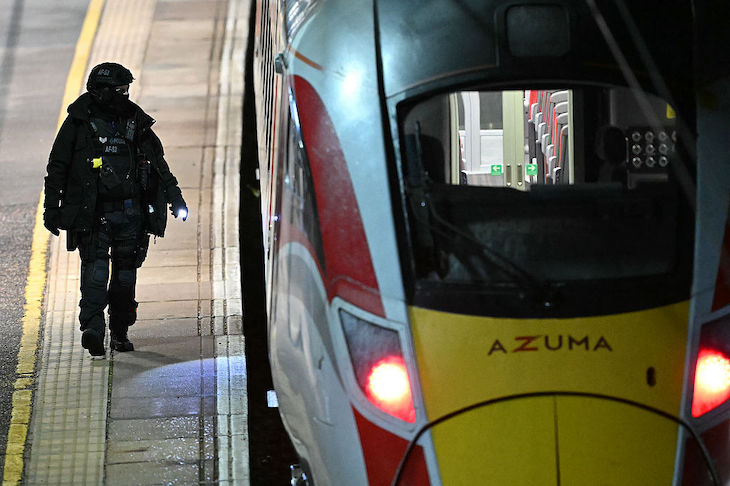When a maniac ran amok on a train near Huntingdon on Saturday, train steward Samir Zitouni put his life on the line. Zitouni bravely blocked the attacker from stabbing a girl, leaving him with a gash on his head and neck. The railway worker remains critically unwell in hospital. His family say they are ‘immensely proud of Sam and his courage’. They’re right to be: Zitouni saved numerous lives.
Whether or not Zitouni is an immigrant isn’t clear – and nor does it matter
But as Zitouni, who has worked for LNER for more than 20 years, recovers in hospital following the brutal attack, he is being used by some as a political football.
‘B****y immigrants coming here and…oh. Saving our lives,’ thundered Brendan Cox, husband of the murdered MP Jo Cox, and formerly of the foundation named after her. When Robert Jenrick, who had called for strong measures on migration control, praised the steward (an entirely understandable reaction), he in turn found himself accused of ‘shameless hypocrisy’ as someone who wished to limit the entry of those with ‘brown faces’ who threatened ‘our culture.’
Whether or not Zitouni is an immigrant isn’t clear – and nor does it matter. His actions were the best of British. But this isn’t the first time that an obsession with identity appears to be the priority for some progressives.
Do you remember, for example, being repeatedly reminded of the background of people like star athlete Mo Farah, or tennis champion Emma Raducanu? Some even went so far as to suggest that their success demolished the case for serious immigration restrictions. Such sentiments have long gone down a treat in progressive circles and among left-wing MPs. And indeed at first sight they look like sweet humanitarian reasonableness itself. Who could be so churlish as to belittle the achievements of a Zitouni, a Farah or a Raducanu, or to shut off the chance that a future immigrant might emulate them?
They are nevertheless hogwash.
The fact that a small number of migrants to the UK have, to our great good fortune, covered themselves in glory doesn’t say anything about immigrants as a whole; and it certainly says nothing about the desirability of increasing the level of migration. To suggest the contrary is the intellectual equivalent of telling people to buy as many lottery tickets as they can because one of them might make them a millionaire – or to have as many children as possible because one might just grow up to be a latter-day Beethoven.
Even if we make the assumption that immigrants do on average make a net contribution to our economic and cultural life (which is possibly true as regards past arrivals, though today the matter is more arguable), this is still not a serious argument for increasing raw migrant numbers. The interest of any state, especially one like Britain which is at present suffering a grievous brain and money drain, is actually to be as selective as possible. It sounds brutal but we need to eliminate the tail of unproductive or unskilled migrants who do our economy and polity little good. Averages are all very well. But to succeed, this country needs to aim not for the average but to a point well above it: something that requires us to accept only the very best of those who apply. If there are only a handful of these, so be it.
It’s worth noting that a cautious immigration policy of this sort strongly benefits migrants already here. Indeed it does so more, if anything, than people whose families have lived here for generations. We offer much to, and warmly welcome, those with ambitions to muck in, embrace our values and help build our country. Such people, however, have the same interest as everyone else in preventing governments adopting lax settlement policies that admit too many people who do not contribute to our economy and subvert, rather than contribute to, our society. But they also have an additional interest. The more migrants we take who are unproductive or undesirable, the more we deprive decent migrant communities of their pride in having succeeded in Britain and give them an undeserved bad name.
So, no: the horror – and heroics – that unfolded on a train last weekend in no way indicate a need for more open borders.
Zitouni is a British hero. When faced with a crisis, he showed the kind of instinctive courage we admire in anyone. Please: let’s focus on Zitouni’s actions – rather than obsess about his identity.







Comments